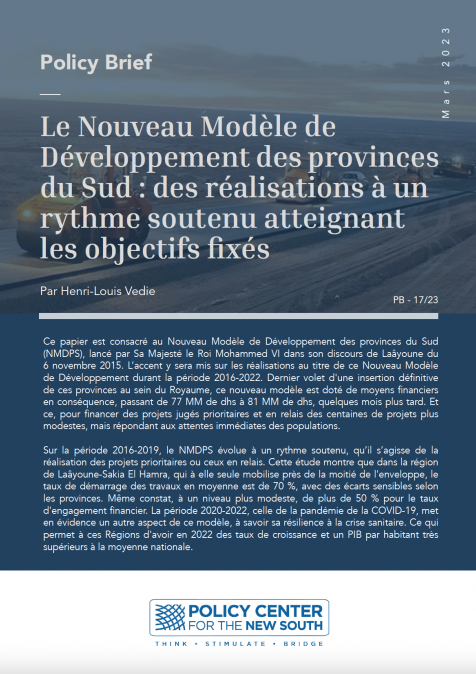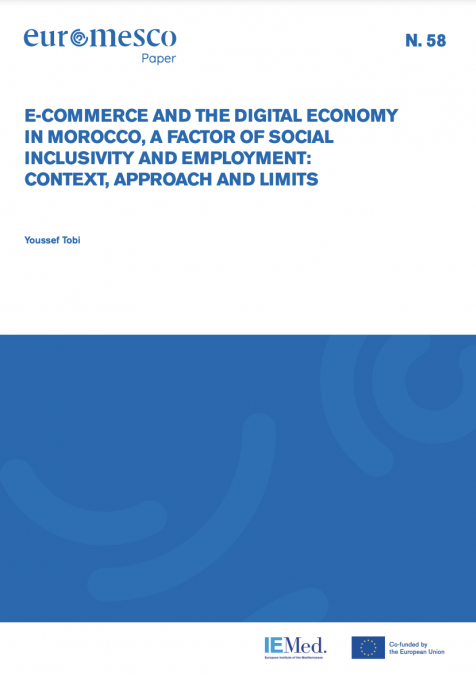Publications /
Opinion
The Policy Brief ‘Pandemic, Preparedness, Morocco, and Africa’ by Uri Dadush provoked a personal reaction: Morocco may never be crowned football’s world champions, alas, but which nation, besides China, New Zealand, Israel, Japan, Denmark, Vietnam, organized its anti-COVID-19 offensive more digitally and in a more modern way than the Kingdom? Morocco’s bureaucracy is at times suffocating and unpleasant, its public hospital system stressed and underfunded. But today I can vouch for another system, anchored in the twenty-first century.
Like millions of Moroccan citizens, I contacted the free number 1717 online, gave my residence card number, and a few hours later I was informed by the system that I was expected at the Centre de Santé Urbain at Bab Doukkalla, near the Medina of Marrakesh, for my first coronavirus vaccination, which I attended punctually. For my second vaccine dose, the digital system reminded me on the day of my appointment—just imagine, in a country where punctuality is often a luxury item. There was no paperwork and I did not have to pay one centime, thanks to the gracious king Mohammed VI, who included resident foreigners in his generous gesture. A day or so later I was able to print out my vaccination certificate. The international media, Le Monde for example (March 28), hailed “the success of Morocco” and reminded their readers (March 11) that the kingdom had already vaccinated more than four million citizens with at least one dose, equivalent to 11% of its population. Le Monde quoted a 61 year old engineer in Casablanca: “For once we don’t have to envy the Westerners”.
In his thoughtful study, Uri Dadush did not succumb to euphoria, recalling that thousands of Moroccans have died and hundreds of thousands have tested positive for the virus. “In 2020 the Moroccan economy suffered the worst contraction since independence, shrinking by 7%. The pandemic is far from over, but the arrival of remarkably effective and safe vaccines, and their relatively rapid deployment in Morocco, is a reason for hope” he noted. Attention in Morocco and around the world is now turning towards prevention of the next pandemic or, if prevention fails, preparing a better response, wrote Dadush. In the current pandemic, dozens of nations have not yet received the promised vaccinations, or just a fraction. Promised deliveries have not reached Nigeria, Kenya and Ethiopia, or large nations such as Brazil, which has buried hundreds of thousands of citizens to date. India is suffering up to 4000 COVID-19 deaths a day. Worse, the country is suffering from a vaccine shortage, and decided to temporarily halt all exports of the Oxford/Astra Zeneca vaccine, forcing many governments worldwide to scramble to secure doses elsewhere. The global “Covax” vaccine-sharing scheme, stated The Guardian (April 22) revealed a “big shortfall”, with only one in five of the estimated number of Oxford/AstraZeneca doses arriving in May, “starkly illustrating the cost of export bans, hoarding and supply shortages for a scheme that represents a key lifeline for many in the developing world”.
Pointing the Way for Africa
The debate is slowly advancing globally about how to approach future virus preparedness. Is globalization the answer, cooperation between nations to develop a united system of vaccines, personal protective equipment, ventilators, and other medical supplies? Or should it be a national priority: the building of factories to assure supply in an emergency? Morocco was, allegedly, promised10 million doses by Beijing, but only 1.5 million have arrived. The temptation may take hold to trust the national effort, but for what kind of pandemic?
How can African nations, many of them pushed by economic crisis into the shadow of collapse, improve their health systems dramatically with limited fiscal resources, as Mr Dadush suggests? He mentions that the number of doctors in large-population countries in sub-Saharan Africa ranges from 0.1 percent per thousand population to 0.9 percent thousand population. In Morocco, there are just 0.7 per cent per thousand. This compares with 2.6 per thousand in the United States and 3.5 per thousand in the European Union. Dadush posits that“the poorer countries need more aid to invest in better healthcare and to deal with the economic fallout from the crisis”. He is right, but the nations of the world face historic economic challenges, driving even the U.S. into trillions of debt, to be paid one day by whom?
McKinsey has estimated that an effective preparedness strategy at the global level—involving all countries—would cost 20 billion to 30 billion dollars in upfront investment over two years, followed by an annual outlay of 5 billion to 10 billion dollars. In the scenario explored by McKinsey, explains author Dadush,preparedness would include an early warning system in every region, the building of emergency centers for crisis management, writes Uri Dadush in his study, stockpiling of equipment and medicines, and regular simulations of rapid response scenarios. “Considering the damage inflicted by a pandemic can reach tens of trillions of dollars, the likely return on investment in preparedness is high even if the mitigations is only minimally effective,” Dadush wrote. In his think piece, the author proposes that all countries, “even the poorest in Africa, must invest in preparedness”. HW Which organizations are capable of managing a global preparedness center? The World Health Organization was criticized because of a slow response to COVID-19, and alleged complacency in the face of the Chinese slow information flow concerning the virus discovered in a local animal market.
COVID-19 has been in the news now for 18 months. Scientists have been able to develop at unusual speed and with global cooperation 12 vaccines of various kinds. About 180potential vaccines are now in preclinical trial development. These statistics make good reading but, concludes Claire Felter of the Council on Foreign Affairs (April 27, 2021),“production challenges, vaccine nationalism, and new virus strains, are all presenting hurdles”. Current global manufacturing capabilities are far below what is needed—only about a dozen countries have the capacity to produceCOVID-19vaccines. Wealthy nations struck deals with manufacturers to provide their countries with more than enough doses, leaving lower-income countries able to immunize only a small portion of their people. Nevertheless, Dadush seems to hesitate between a national solution, or a model of international coordination that would ensure that “countries with less resources don’t get elbowed out of the way”. In the end, the primary responsibility for pandemic preparedness lies with countries, Dadush concludes :“”Morocco’s rapid deployment of vaccines,and it’s just announced health reform are only a start, but they pointthe way for the rest of Africa”.
The opinions expressed in this article belong to the author.







